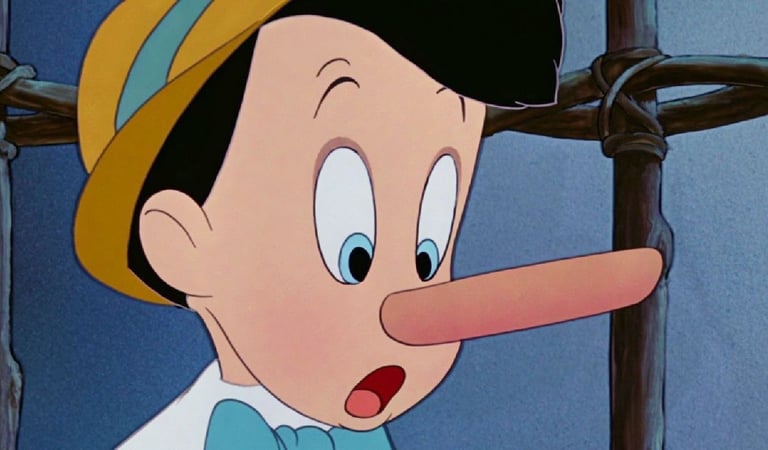A Different Sort of Pinocchio: How a Speck Becomes a Log
Slichot 5785
9/12/20254 min read


This blog will mostly be a creative, public journal of sorts, and I plan to share about my mental and spiritual health journey. Much of the recent struggle in these areas of my life has resulted, in part, from my unwillingness or inability to hear or accept others in my life pointing out things that I needed to confront in myself or changes that I needed to consider making. This shorter, teaser post – if you will – relates to that issue.
Recently, I was reminded of the parable of the speck in the eye and the log in the eye (Matthew 7). One of the wonderful things about parables is that, though you may be able to derive a very specific and succinct moral from them, there is always more to explore in the nuance of their narrative forms. The immediately apparent moral of the parable about the person with the log in his eye attempting to remove a speck from the eye of his friend is that, if you have a big problem in your own life which you have not yet addressed, it is unwise to go and try to help your friend deal with a much smaller problem in his/her life; but there are many more layers to this and a couple of them jumped out to me.
First, beyond the challenge presented by attempting to help our friend with a small problem while we have not dealt with the big problem in our own life, we all too often distract ourselves from a big problem that we are dealing with – or, better put, avoiding – by finding much smaller things in others to criticize, often under the guise of wanting to help them. I have been guilty of this myself many times. In fact, my wife and I recently noted in a counseling session that one of the problems we often experienced earlier on in our marriage was that I tried to take responsibility for her stuff and she tried to take responsibility for mine; neither one of us was really being responsible for our own stuff. The second thing that jumped out to me is a bit more subtle but perhaps even more important: the question of “How on earth did a log get in my eye to begin with?” Wouldn't I have noticed? How am I running around pointing out specks in my friends’ eyes and I seriously haven't even realized that I have a giant chunk of wood in my own eye?
My theory is that this log didn't start out as a log, but began as just another speck which, when ignored or avoided, was joined by another speck and another and another until that original speck has grown, much like Pinocchio's nose, into a log. That log could be one big problem that started out small, but I never dealt with it and allowed it to fester and grow like a cancerous tumor, or it could be an accumulation of lots of small problems and a habit of not addressing them. So how did I miss all of those specks? Why did I avoid them? Perhaps I had someone who tried to point them out to me, but I didn't want to listen. Maybe I didn't want to admit that I had a speck to deal with because I was embarrassed or ashamed. My prideful desire for self-sufficiency might get in the way of me accepting help and being honest with myself that I needed someone else to point out an issue that I had missed. Whatever the reason, there are so many times when many of us struggle to accept constructive criticism – whether moral, practical, or even creative. I think of my work as a teacher. I teach middle schoolers and they definitely have a propensity for finding things about which to complain. I could be somewhat justified in dismissing any negative comments that they might make. However, even though a lot of their comments might be inaccurate or excessively negative due to the students’ incomplete or immature perspective, there is a lot I can learn about becoming a better teacher by listening to the feedback that they have for me. Sometimes, when I am able to be open to hearing criticism from them, I realize that they are right and have identified a shortcoming in myself that I would have missed on my own. When I acknowledge and fix it, that's when real progress happens and my relationship with my students grows. I earn their respect, they see my care for them, and I'm able to teach them in a way that works even better for them.
All of us benefit from listening to the observations and constructive criticisms of those around us, particularly trusted companions and wise mentors. We all miss things within ourselves and need others’ help to identify where we still need to work on ourselves or adjust our lifestyles. Especially if we are in a position of authority – as parents, teachers, supervisors, spiritual leaders, etc. – it is invaluable for us to maintain our humility and be secure enough in our identities and our roles to be able to hear observations, suggestions, and even criticisms without taking them personally, becoming defensive, or rejecting them out-of-hand. I would encourage all of us, in this season of soul-searching, to take a deep breath, open our ears, minds, and hearts, and listen for that glimmer of hope where the criticism that might feel gorily painful in the moment can become gloriously constructive if we only allow it to do so.
L’chayim and Shabbat shalom!
